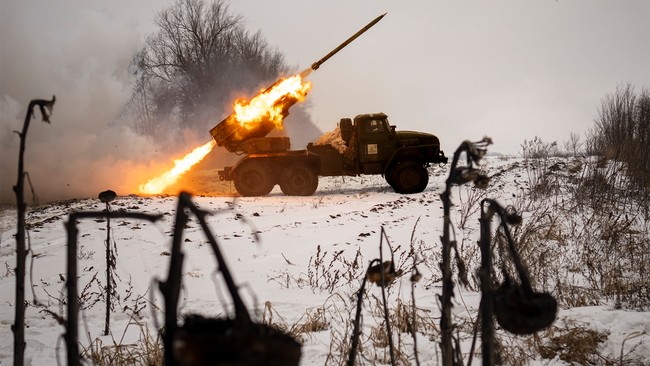EU Moves to Use Frozen Russian Assets for Ukraine Aid
In a collective stance against Russian invasion, the EU, under G7 and US pressure, is working to repurpose frozen Russian assets to financially bolster Ukraine's defense and recovery efforts.
Published May 10, 2024 - 00:05am

Image recovered from pjmedia.com
European authorities have devised a plan in response to Russia's incursion into Ukraine that has strategic and financial implications far beyond the battlefield. A significant portion of the funds, approximately $210 billion in frozen Russian central bank assets, will be reallocated with the aim to procure weapons for Kyiv and support Ukraine's reconstruction. Amidst the geopolitical turmoil, this decision by the European Union, catering to strong advocacy from Washington, indicates a marked escalation in the economic front of the conflict between the West and the Kremlin.
The central bank in Moscow, now deprived of access to these funds, faces an indirect but potent financial blowback from the international community. These actions, approved by the G7 nations under US instigation, aim to strengthen Ukraine's military situation, which grows increasingly dire. Members of the US House of Representatives have also signaled their commitment by voting to authorize the transfer of $95 billion in Russian assets held in the United States to Ukraine's cause.
In Brussels, a compromise has allowed member states like Austria, Ireland, Malta, and Cyprus to pivot their assistance from military aid to humanitarian relief, should they choose. This financial maneuver, endorsed by EU Commission President Ursula von der Leyen and expected to commence by July, potentially lays the groundwork for significant grants and loans to Ukraine, contingent on reforms.
Despite the unified stand, Ukrainian officials express that the measures are insufficient and call for the complete confiscation of Russian assets. European economists voice concerns about the repercussions such an act could have on the EU's image as a financial safe haven and the potential precedent it sets for future international deposits. Climbing to 0.3%, handling fees that Euroclear—the central institution holding the assets—charges on the frozen funds have been sharply reduced, signifying just one layer of the intricate economic tapestry being woven.
Simultaneously, the legal and economic risks of outright seizing these assets loom large, with Moscow threatening retaliatory measures and potential long-term legal disputes that could reverberate through Western markets and beyond. The stakes of this financial warfare are high, with far-reaching implications for private and state assets and the overall stability of financial institutions, underlining the hybrid nature of the conflict that extends well into the economic sphere.
The maneuvers by the European Union and its transatlantic allies herald a new chapter in economic statecraft, with European capitals navigating a delicate balance between punishing Moscow and maintaining global financial norms. The tailored application of economic sanctions, particularly those that target the assets of a sovereign nation's central bank, is unprecedented and underscores the deepening resolve to support Ukraine. The EU's measure reflects a nuanced approach that seeks to maintain cohesion within its member states while sending a resolute message to Russia about the consequences of its military aggression against Ukraine.
Policymakers across Europe are under pressure to act with agility and creativity. The reallocation of frozen assets is an ambitious step, but its implementation is fraught with possible legal challenges. The measures are seen as a test case for how Western powers might leverage economic policies and regulations to address geopolitical crises. Legal experts are keenly observing the interplay between international law, property rights, and the imperatives of national security as they unfold in real-time. The European Commission has underscored that any disbursement of funds will accord with international law and the principles of the EU financial system. Nonetheless, a protracted legal battle is likely, as Russia's response unfolds in the legal arena.
The dynamic nature of the conflict has forced a reevaluation of international financial systems and their resilience against the backdrop of geopolitical shocks. A key facet of such resilience is the adaptability of financial regulations to account for the need to immobilize and, if necessary, redirect funds connected to national security threats. In this vein, the EU's decision could redefine the global financial landscape, where sovereign assets could be deployed as a mechanism to counter aggression and uphold international peace and stability.
While the EU's plan is a significant stride in economic sanctions, its efficacy in changing the course of the conflict remains to be seen. Military analysts speculate on the impact it will have on Ukraine's armed resistance against Russian forces. They argue that the effectiveness will be proportional to the speed and extent of converting the frozen funds into tangible support. The political will of Western nations to sustain such economic strategies in the face of potential retaliatory actions is also being closely monitored.
The economic battlefield is increasingly mirroring the complexity of the physical frontline, with strategies and counterstrategies developing in a global game of economic chess. As funds are redirected in support of Ukraine, the reverberations of this decision will likely ripple outwards, influencing global finance and international relations for years to come. Nations are watching attentively as Europe takes a leading role in the economic dimension of international security, with the outcome of these efforts carrying implications for the European Union's financial and political unity in the face of external threats.







